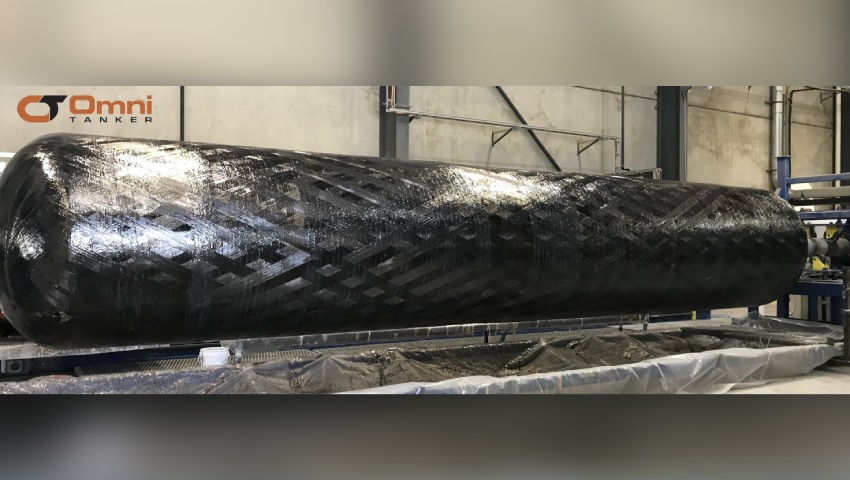The prime is collaborating with the stakeholders to develop new composite tanker technology, funded by a government grant.
To continue reading the rest of this article, please log in.
Create free account to get unlimited news articles and more!
Lockheed Martin has confirmed it has teamed up with Australian manufacturer Omni Tanker and UNSW Sydney to develop and commercialise composite tank technologies, supported by a $1.4 million grant from the Commonwealth government’s Advanced Manufacturing Growth Centre (AMGC).
The project, which comes off the back of AMGC’s Commercialisation Fund launch, aims to leverage locally-built technologies to address challenges using composites for the transportation and storage of liquid hydrogen with applications on ground, in the air, underwater and in space.
As part of the collaboration, nano-engineering technology developed by UNSW in partnership with Lockheed Martin and Omni Tanker, and Omni Tanker’s OmniBIND technology would be used to develop two new operational scale propellant tanks for storing cryogenic liquid fuels for commercial and civil satellite programs.
The propellant tanks include a ‘Type IV’ fluoropolymer-lined carbon fibre composite tank, and a ‘Type V’ linerless carbon fibre composite tank.
Both tanks are designed for high pressures, the extreme cryogenic temperatures required for liquid hydrogen as well as oxygen, hydrogen peroxide and hydrazine.
“Lockheed Martin invests millions of dollars every year into R&D programs with our Australian industry and research partners to solve real challenges facing our global supply chains,” Christopher Hess, head of industrial development at Lockheed Martin Australia, said.
“We have had a long-standing research collaboration with UNSW and Omni Tanker, and we are grateful for the support of the AMGC as we now look to commercialise these cutting-edge, Australian-developed composite tank technologies for a number of Lockheed Martin and NASA applications.”
David Ball, regional director Australia and New Zealand, Lockheed Martin Space, said the of composite tanks would be lightweight, cost-effective, and resistant to microcracking and permeation.
“As the world increasingly looks to hydrogen for emission-free energy, containing and transporting it in a safe, cost-effective and economic manner remains extremely challenging,” he added.
“The space industry is particularly interested in the development of linerless composite tanks for their weight efficiency and durability, which represent the cutting edge of composite pressure vessel manufacturing.”
Ball said the technologies have the potential to support the growth of Australia’s sovereign space capabilities, strengthen exports to space-faring allies and partner nations, and contribute to future space missions, particularly in on-orbit storage, launch and deep space exploration.
Dr Jens Goennemann, managing director of AMGC, acknowledged the challenges associated with transporting liquid hydrogen.
“That’s why AMGC is supporting Omni Tanker and its collaborative partners to engineer and manufacture a solution to this problem and offer it globally,” Dr Goennemann said.
The development project will draw from UNSW research, with Professor Chun Wang’s team exploring carbon fibre composites capable of withstanding liquid hydrogen temperatures without matrix cracks.
“This new technology is the result of an outstanding collaboration and partnership between UNSW, Lockheed Martin and Omni Tanker over the past four years,” Professor Wong said
“It is wonderful seeing our research achievement is now moving closer towards commercial success and generating social and economic impact in Australia and beyond.”
Omni Tanker’s CEO, Daniel Rodgers, added that the next phase of the collaboration with Lockheed Martin and UNSW would involve integrating thermoplastic lining technology in the aerospace sector.
“The OmniBIND technology has made inroads to revolutionising the safe and efficient movement of challenging liquids within the chemical transport sector,” Rodgers said.
“Now the growing need to decarbonise the energy industry, and the re-usable low-Earth orbit satellite market, have the potential to drive major utilisation for these new technologies.”
Omni Tanker’s CTO, Dr Luke Djukic, added, “We are excited to work with Lockheed Martin and UNSW on this ground-breaking project, which leverages our patented technology.
“It is also a credit to the talented Australian engineering team that we have assembled at Omni Tanker.”
[Related: Lockheed Martin launches next-generation GPS III satellite to orbit]
Charbel Kadib
News Editor – Defence and Security, Momentum Media
Prior to joining the defence and aerospace team in 2020, Charbel was news editor of The Adviser and Mortgage Business, where he covered developments in the banking and financial services sector for three years. Charbel has a keen interest in geopolitics and international relations, graduating from the University of Notre Dame with a double major in politics and journalism. Charbel has also completed internships with The Australian Department of Communications and the Arts and public relations agency Fifty Acres.

 Login
Login








